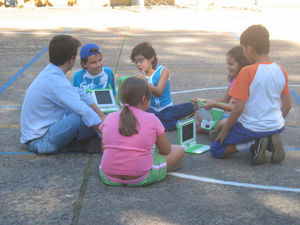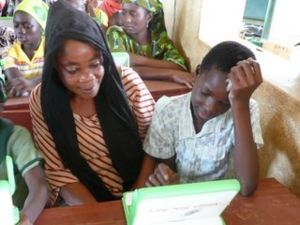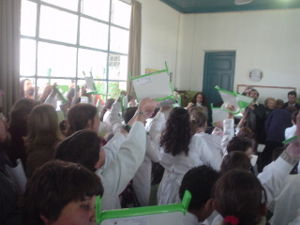Educators/lang-ja
- This is an on-going translation
ようこそ
One Laptop per Childは教育のプロジェクトであり、ノートパソコンのプロジェクトではありません。 私たちのゴールは知識、考え、経験、芸術などのライブラリーに子どもたちが触れる機会を提供することです。 私たちは、この教材が世界への窓として働き、このプロジェクトを構築するための例や参考とともに完成する事を望んでいます。
このページは、ライブラリーや知識の構築に貢献することや、XOを授業で使っている教員のコミュニティーをサポートすることに興味のある教育の専門家や教師のためのコミュニティーとして作られています。 もしあなたが、現在XOを授業で使っていたり、今から使おうとしているならば、XO Teachersのコミュニティーのページも参考となることでしょう。
世界では、すでにたくさんの(OLPCの)ノートパソコンが、実験校に配布されています。 この夏、最後の"B4"ベータテストのためのノートパソコンが、さらに数千人の子どもたちの手元に届く予定です。 最初の公式な生産台数はは数百万台と見積もられており、その数はそこからどんどん増えます。
今は、OLPCに参加するに当たってもっともエキサイティングな時期といえるでしょう。 このページの助けを借りて、あなたもOLPCに参加してみてください。
ハイライト
| Porto Alegre OLPC Brazil |
Galadima OLPC Nigeria |
Ban Samkha OLPC Thailand |
Cardal OLPC Uruguay |
Arahuay OLPC Peru |
|---|---|---|---|---|
File:Hiking02.jpg Ban Samkha is a rural village in northern Thailand |
"Pupils go even beyond what I can teach in the class. It's a very interesting thing to use. I personally have a better idea about teaching... We discovered that giving them time to discover something and to do it in their own way, they feel more happy and they are so excited in using it that, 'Yes, I discovered it! Yes, I can get it!! Yes, I can do this on my own!!!' Teaching is getting more interesting and less stressful." — Mr. O., Galadima School, Abuja, Nigeria
A note of context: TRIAL-2 is just now getting started, so most of these links (currently all) are from TRIAL-1. Which mostly used very limited (pre-alpha) software, on mainly early, more limited hardware prototypes. So the answer to why they aren't making greater use of their Journals, and online collaborative capabilities, is they mostly didn't have them yet.
ビジョン
The XO laptop will bring a world of new ideas, images, and materials to children around the world. It will also provide students and teachers with new ways to collaborate, create, and transform works over time. Our belief in collaboration as a fundamental part of learning underscores our commitment to editable document formats, revision tracking, and careful attribution of authors and sources.
All of our projects are collaborative, and this wiki is where each of our projects takes shape. If you take a look around, you'll find projects in all stages of completion-- from rough outlines and meeting notes to detailed workplans and polished documents. Feel free to contribute your ideas and expertise to any project that interests you. We're counting on you to make OLPC a success.
To learn more about our model for content creation, our network of curators, and our plan for school servers that will host (and share) each school's digital library, visit Content. Otherwise, keep reading to find out how you can join in.
参加しよう
手始めに何をするのが面白いだろう?
- Read about the OLPC Learning Vision to learn more about why we think children in developing countries need laptops and what we think laptops will enable them to do.
- Visit the OLPC Education Portal.
- Read an overview of our current pilot programs, visit the OLPC Ceibal blog, or read field notes from Nigeria and Thailand.
- Familiarize yourself with our ideas about content and collaboration, and the various Creative Commons licenses. As a rule, we want educational materials produced for and connected with OLPC to be free and open source.
- Contribute ideas (you can learn about contributing to a wiki ...where??).
そしてその次は?
Play, learn, explore, exchange-- you can do anything you want! Here are some ideas to help you get started.
- Eventually, the following sub-categories should each have their own page... --Lauren 18:51, 6 July 2007 (EDT)
コミュニティに参加しよう
コンテンツ作成に貢献しよう
- Read about the content repository that will reside on the school servers.
- Add to the list of ideas for content that should be included in the repository.
- Contribute your content directly to OLPC by following these instructions.
アクティビティを作成しよう
- Read the educational activity guidelines to learn about the features of the XO that pertain directly to educators.
- Explore our repository of activity outlines and lesson plans.
- Contribute to our collection of story-based learning activities.
- Create a new activity, either based on one of our sample learning activities or entirely from scratch.
よくある質問と答え
Ask a question and someone will try to answer it.
ご意見と議論
Please leave comments on the Educators talk page.



